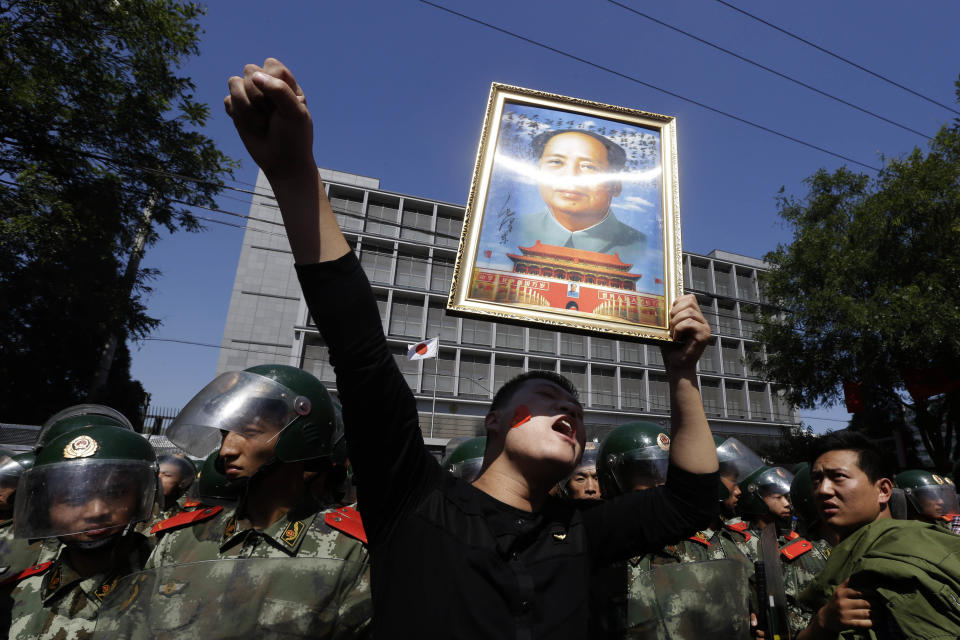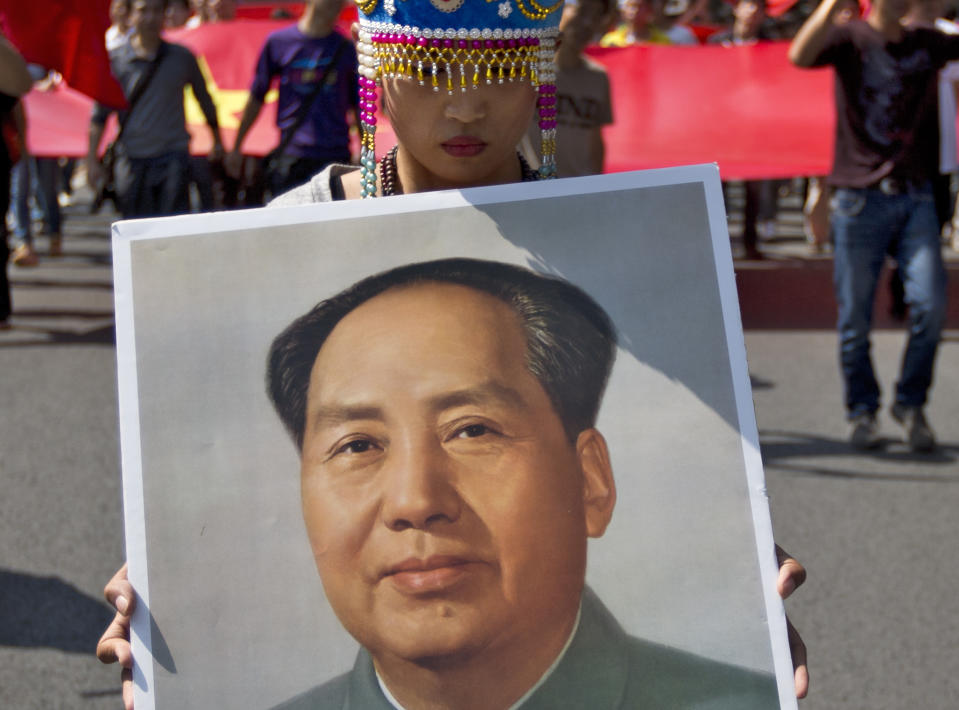In protests, Mao holds subtle messages for Beijing
BEIJING (AP) — The face of dissatisfaction with China's Communist Party is the face of the man synonymous with it: Mao Zedong.
Portraits of the revolutionary leader often led packs of demonstrators in protests over Japan's effort last week to bolster its hold on islands claimed by China. Many were hoisted by people born after his death 36 years ago.
Mao, widely revered by Chinese and praised by Communist Party leaders, is supposed to serve as a unifying symbol, but it often isn't so.
To some he represents a condemnation of corruption and inequality under a government that long ago abandoned his radical policies. More frequently this week, his image was a subtle slap by nationalists who accuse leaders of being too weak in the territorial dispute.
"Mao Zedong was tough. He never backed down when it came to the national interests," said Lu Lei, a Beijing salesman who went to the Japanese Embassy with his friends to protest Tuesday. "Our current government is spineless. If Mao were alive, we would have already attacked Japan."
Mao has become a safe way for Chinese to criticize a government bent on stifling dissent. His giant portrait still looks out to Tiananmen Square in the heart of Beijing, and his name is etched into the country's constitution and the party's charter, even if his ideology has been abandoned in practice.
His image has rarely been displayed in such numbers as during the protests this week. Rows of his portraits floated through the parades — often in the company of a sea of red flags — in an eerie resemblance to the scenes from the fervent days of the Cultural Revolution when Mao was worshipped as a god.
Behind the scenes of the angry protests that rippled across more than two dozen cities this week runs an undercurrent of grievances, many of them critical of the government.
Protesters held up signs that touched on broader social issues such as corruption, food safety and the widening gap between poor and rich. Some protesters even joked that urban code enforcers — resented by the Chinese public for their brutality against unlicensed street peddlers — should be sent to fight the Japanese military.
Those messages mixed with anti-Japanese slogans on a rare occasion where the government tolerated and at time abetted public demonstrations.
"This movement has multiple purposes. Nationalism is only part of the protests." said Zheng Yongnian, director of the East Asian Institute at the National University of Singapore. "More people are angry about the current government, and they wanted to use this opportunity to vent."
The government, normally inclined to crush protests, allowed these of public anti-Japanese fury to gain leverage in its latest tiff with Tokyo over small uninhabited East China Sea islands called the Senkaku by Japanese and the Diaoyu by Chinese.
Japan controls the islands and purchased them from their private owners last week, thwarting plans by Tokyo's nationalistic governor to buy and develop them. China responded with furious rhetoric.
Both countries have sent patrol ships to the waters surrounding the islands, and there is no sign of progress in resolving the dispute between the two Asian economic powerhouses.
Allowing the protests, however, carries risks for China, as protesters can bend the intended message. They sent a quiet critique with a sign seemingly hard for the government to quarrel with: "Chairman Mao, we are missing you very much."
After his death in 1976, Mao was much criticized for radical excesses in which tens of millions killed and persecuted in mass movements. Laid-off workers, however, eventually began parading his portrait at protests as a plea for more egalitarian policies.
Mao first became a protest icon about a decade ago during mass layoffs that accompanied privatization of state industries. Social injustice, corruption and a yawning rich-poor gap have only worsened since and were themes amid the anti-Japan protests.
Many Chinese are worried about the chairman's re-emergence on the scene. His most ardent supporters tend to be stridently nationalistic and advocate an authoritarian populism. Some protesters called for the release of Bo Xilai, the disgraced politician and a populist who was ousted from the leadership in a political scandal.
Wang Zheng, a Beijing teacher who has been detained for her support of Bo, said the public remembers Mao as a resolute man who showed no ambiguity on sovereignty issues.
"Our government has been spineless on many things — Diaoyu being one of them," she said. "The diplomatic protests are meaningless when they are not backed with actions. The government has behaved the same year after year, making the public more nostalgic about Mao."
Some protesters employed other methods to use the outrage against Japan as a jumping-off point to deliver other messages.
In Beijing, some held up signs saying they would be willing to eat unsafe food to reclaim the islands. Food safety is a big public concern in China.
In Changsha, a small group of protesters at an anti-Japan rally held up a hand-written sign calling for the ouster of corrupt officials. Some of them wore mouth covers marked with an "X."
"That means we cannot freely speak our minds," local protester Wu Qingjun said.
Wu said his group did not catch police attention, but the rights group China Human Rights Defenders reported at least three cases when activists were taken away.
It said Jiao Guobian, a former college teacher, was arrested on Sept. 12 on suspicion of "inciting subversion of state power," allegedly for saying the government should have kept an eye as close on the islands as it does on dissidents.







